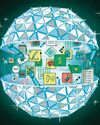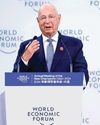
Generation after generation faces its test of conflict management: crafting the Constitution itself, with all its convictions and compromises; balancing local vs. federal power centers; a Civil War exposing fissures in democracy's bedrock; and on and on, battles over rights and responsibilities, suffrage, prohibition, isolation vs. intervention, and then the serial upheavals over justice for multiple marginalized groups-Black, female, gay, trans. Each era is tasked with not only choosing its fights but also deciding how to fight them.
Our current crisis of division, once again manifest as violence, feels shocking but not sudden; the dread has been deepening for years, a defining quality of this century that began with an election that ended in a tie. As our information streams fill with acid, it eats at grace and trust. Americans have always disagreed, exercised muscles of reason and passion to press for progress and a vision for the common good that we don't necessarily hold in common. Do we care more about freedom or equality? Privacy or security? Being a leader in the world or tucked in safely at home with oceans to buffer us? Figuring that out was the heart of the democratic challenge, but the information technologies allegedly designed to connect the world conspire to dismantle the values that process depends on.
The tragedy, but maybe also the opportunity, of this moment is that relative to past brawls, Americans are largely united on key issues-even if you would never know it from the temperature of the debate. "Red states" from Arkansas to Missouri to Florida pass minimum-wage referendums by fat majorities; Kansas votes to protect access to abortion.
Two-thirds of Democrats agree that the situation at the border is a problem; more than 60% of people think it's too easy to get a gun; and about 80% worry about the solvency of Social Security and Medicare.
Esta historia es de la edición August 05, 2024 de Time.
Comience su prueba gratuita de Magzter GOLD de 7 días para acceder a miles de historias premium seleccionadas y a más de 9,000 revistas y periódicos.
Ya eres suscriptor ? Conectar
Esta historia es de la edición August 05, 2024 de Time.
Comience su prueba gratuita de Magzter GOLD de 7 días para acceder a miles de historias premium seleccionadas y a más de 9,000 revistas y periódicos.
Ya eres suscriptor? Conectar

Q & A: Borge Brende
The World Economic Forum president talks with TIME editor Sam Jacobs

Q & A - Rene Haas
Arm's CEO on how his hardware is supporting the Fourth Industrial Revolution

The conflicts looming over 2025
WHEN DONALD TRUMP TOOK THE OATH OF OFFICE AS President in January 2017, his first foreign policy priority was to get tough on China. The Trump 2.0 Administration will continue that work. But when he strides back into the Oval Office in January 2025, Trump will also become responsible for U.S. management of two dangerous wars, the kinds of hot foreign policy crises he was fortunate to avoid during his first term.

Rev Lebaredian
Nvidia's vice president of Omniverse and simulation technology on training AI-powered robots

5 predictions for AI in 2025
New uses and policy questions come into focus

Roy Wood Jr. The comedian on his new stand-up special, the importance of working in food service, and learning from Keanu Reeves
8 QUESTIONS WITH Roy Wood Jr.

A call for global cooperation in the Intelligent Age
Cultivate wisdom along with innovation

The D.C. Brief
IN THE END, THE THREAT OF A FARright revolt proved more menacing than most imagined, as Republican Mike Johnson initially came up short on Jan. 3 during the first balloting to keep him as Speaker.

The digital labor revolution
OVER THE PAST TWO YEARS, WE'VE WITNESSED advances in AI that have captured our imaginations with unprecedented capabilities in language and ingenuity. And yet, as impressive as these developments have been, they're only the opening act. We are now entering a new era of autonomous AI agents that take action on their own and augment the work of humans. This isn't just an evolution of technology. It's a revolution that will fundamentally redefine how humans work, live, and connect with one another from this point forward.

Tech we can trust
Serving humanity's best interests must be at the center of progress